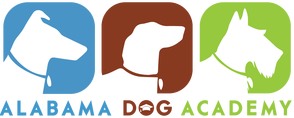|
If you’ve ever had a dog in your house, you’ve probably spent a lot of time thinking about Pee and Poo. Maybe you’ve spent a lot of time looking at it, smelling it, and cleaning it up too. Potty training is the #1 reason people contact dog trainers. If you’ve had a dog pee or poo in your house, then you know that lack of potty training is the #1 reason why the relationship with your dog may become damaged, and a big reason why dogs end up in shelters! But don't worry, keep reading and you'll learn all the ins and outs of potty training! 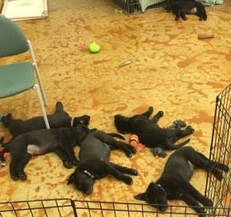 Notice the potty pad available in the upper left corner. Notice the potty pad available in the upper left corner. Baby puppies first learn about hygiene from their mothers: from the moment the puppy is born, a good mamma dog will spend a LOT of her time cleaning the puppies and keeping their nest clean. After a few weeks, when the babies are more mobile, the mamma dog stops cleaning up after the puppies and expects them to walk outside of their nest to potty; it’s at this point that good breeders and puppy caretakers will provide puppies with enough space to walk away to potty. Once the puppies reach about 6 weeks old, they should be going outside regularly to get used to pottying on grass. By the time you bring your puppy home from the breeder, even as early as 8 weeks old, he should prefer to potty outside, and prefer to not potty in his bed. If you’re looking for a puppy who’s easy to potty train, make sure he’s learned early in life that his den is a clean space. Before you buy a puppy, make sure that you visit the breeder’s facilities and see that the area where the puppies live is clean. It may not be spotless, but if it’s clear that the puppies are living in their excrement (if the puppies or adult dogs are dirty, if they’re sleeping on top of pee or poo), or if their space is too small for the puppies to learn to walk away to potty (for example if they live in a small kennel or on top of a mesh floor through which pee and poo falls), then you can bet that the puppies have NOT learned the importance of keeping their den clean and will be especially difficult to potty train. My Den is the Dog’s Den, Too. Now you’ve brought Puppy (or a new adult dog) home and need to start potty training right away! The first thing to do is establish potty training rules: Potty Training Rules: Rule #1: Reinforce Puppy for pottying in the correct location. Rule #2: Supervise catch Puppy if he’s about to have an accident. Rule #3: Prevent any mistakes when you can’t supervise Puppy. Understanding the Potty Schedule When Does Puppy Need to Potty? - After he eats and drinks - During and after play, exercise, and a lot of activity. - When he wakes up – first thing in the morning and after naps. If you keep Puppy on a regular schedule of eating, drinking, playing, and sleeping, then he will also potty on a regular schedule!
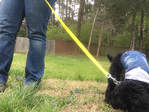 Eli sniffs for a place to potty. Eli sniffs for a place to potty. Now you’re pretty sure Puppy needs to potty! What do you do?? Walk Puppy to his “potty spot.” Taking Puppy to potty in the same spot in the yard every time not only helps keep your yard clean, but generally Puppy too will prefer pottying where he smells his toilet. Stand in one spot and let Puppy sniff around. Puppy is very distractible and often forgets why he’s outside! Try to keep his feet moving (activity and exercise often elicit pottying) and give him calm, quiet praise (“Gooood Puppy…”) whenever he sniffs the ground as this means he’s thinking about going potty. Be sure that YOU stand in one spot; whenever Puppy moves to a new location in the yard he’s bombarded with new and exciting (and distracting!) sights and smells and will forget again why he’s outside. Praise Puppy while he’s pottying. As soon as you see Puppy begin to pee or poo, give him more calm, quiet praise (“Gooood Puppy…”), to let him know THAT’s why we’re outside. Keep it calm while he’s doing his business because getting too excited might make him stop. But as SOON as he’s finished…
Let him play after he finishes pottying. After Puppy has peed and pooed, you can let him off leash to run around the yard and play! This will help teach him that he should potty quickly if he wants to get to playtime. You can also now give him supervised freedom in the house where he gets to play, train, and just generally be a good Puppy in puppy-proofed areas. Remember to supervise and take him outside again about every hour, or when you notice him sniffing like he needs to go potty. 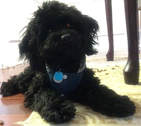 Supervise Puppy in the house! Supervise Puppy in the house! What if Puppy doesn’t potty when you take him outside? Only wait about 5 minutes for Puppy to potty. If he needs to go, he can go quickly. After 5 minutes outside, if he hasn’t pottied, take him back inside. Because you have a pretty good idea that he does need to potty, he needs to stay close to you; you do not want Puppy sneaking away and pottying in the house out of your sight. Tether him to you (tie the leash to you so that he must stay in your sight and close to you) or put him in a crate for about 15-30 minutes, then take him outside to his potty spot again. What about when Puppy has an accident in the house? Close supervision is key: if you see him squat and begin to pee or poo in the house, promptly pick him up (if possible); picking him up almost always makes him stop peeing or pooing. Then get him outside to finish in the Potty Spot. When he does finish pottying outside, be sure to throw another PP! Always reinforce Puppy for pottying in the Potty Spot! 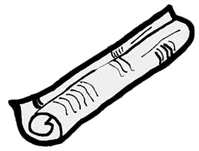 Oh no! Surprise! If you walk into a room in your house and are surprised to find that Puppy has left a puddle or a pile but you did not see him do it, take a rolled up newspaper, and bonk yourself over the head with it! If Puppy potties in the house and nobody catches him in the act, there’s nothing that can be done to train him that he should potty outside. Close supervision is essential for potty training, so that you make sure Puppy only gets to potty outside in his Potty Spot and doesn’t create a new potty spot in the house! When he does pee or poo in the house, I recommend cleaning it up with Nature’s Miracle brand floor cleaner. An enzymatic cleaner, Nature’s Miracle breaks up all the proteins in urine and feces and removes the smell which attracts Puppy to potty there again. You can also pour it in the washing machine to help wash soiled towels and bedding. Do not use ammonia-based cleaners; Puppy won’t know the difference between the smell of ammonia and pee and will continue to pee in that spot. What about when I can't watch him? Puppy needs a safe space to be in when you have to leave the house, go to sleep, or just get too busy to supervise him 100% of the time. You need your breaks from watching Puppy too! The crate is a great management tool to help you make sure Puppy doesn't have any accidents. Here is a good resource for more information about how to choose a crate and train Puppy to enjoy it: If done correctly, the above protocol will lead to potty training success for most puppies. But I venture to guess that if you’re reading this blog, you’re already practicing most of these techniques and are still having too many accidents, right? Here is a list of the questions my clients ask me about potty training. If you're still having trouble potty training your puppy, please contact me - write a comment at the bottom of this blog or click the Contact Me button below, and I'll be happy to help you through all your potty training challenges! Potty Training FAQsCan I use potty pads to train my puppy to potty in the house?
Potty pads are an option if you must leave Puppy for extended periods through the day; Puppy shouldn’t be expected to hold it longer than about 4 hours at a time, so he must have a potty spot in the house for long absences. Make a small, safe Puppy area, just large enough for a bed (or his crate with the door open) and a potty pad. Potty pads aren’t automatic potty trainers, though, you will still have to teach Puppy to potty on the pad. The best way to do this is to use the potty pads consistently, even when you’re home; instead of taking Puppy outside on leash when he needs to potty, take him to his potty pad and reinforce him to pee or poo on it. By about 7-12 months old, puppies can usually hold it for 8-9 hours; at this age you can retrain Puppy to potty outside instead of on the pad.
What if my puppy will not potty when he's on leash or in his potty spot?
Puppy may get distracted by the leash if he’s not used to using it. It helps to practice having him wear the leash when he’s hanging out with you in the house.
Puppy also may have been punished for pottying where he was not supposed to and may be afraid to potty in front of you; you may notice that Puppy prefers hiding behind a tree or bush to potty. You can try giving him a slightly longer leash so that he has space to go potty behind an obstacle; also keep up your Potty Parties whenever he potties in the right place, so that he begins to trust that it’s safe to pee and poo in front of an audience. And NEVER yell at your dog for pottying where he’s not supposed to! Puppy may also just prefer to potty in a different place than where you want him to go. You can try putting a tiny bit of his poo, or a piece of a tissue soaked in his pee, in the Potty Spot to make him think he’s gone in this place before; this will help encourage him to go there again. Why doesn't my puppy tell me when he needs to go potty?
Puppies often don’t realize they need to go potty until it’s almost too late. For Puppy to tell you when he needs to go potty, all of these things have to happen:
1. Puppy realizes he has to potty, and is able to hold it; 2. Puppy remembers what he needs to do to tell you; 3. Puppy is still able to hold it until you realize what he’s trying to tell you. This is usually too much to expect from a young puppy who’s not very good at holding it yet. Watching Puppy’s body language and learning his schedule is a more reliable way of knowing when he needs to go out. It’s also a wonderful way to establish trust: your puppy will learn that you are able to meet his needs even before he realizes for himself what those needs are. Why is my puppy still having accidents even though I have a doggy door?
Puppies don’t automatically understand that outside is for pottying and inside is to be kept clean. He may inadvertently learn that outside is for playing and the house is for pottying in. When Puppy needs to go potty, it’s up to us as leaders to take him to the correct place to go, and to stay right there with him to immediately reinforce when he gets it right.
When will my puppy stop waking me up to go potty at night?
Baby puppies can’t be expected to hold it all night, but by the time Puppy is about 12 weeks old, he should be able to hold it at least half the night. By about six months, Puppy should be able to sleep through the night most of the time. If you are still getting up multiple times in the middle of the night, here are some suggestions to try:
· Take away Puppy’s access to water, and restrict food, no later than two hours before bed. If he’s not doing heavy exercise or spending a lot of time out in the heat, it’s ok for him to wait till the morning to get food and water. · Put Puppy’s crate in the bedroom with you or a family member. Dogs are social animals and relax and sleep better when they’re in the room with their family members. · Make sure overnight potty time is not play time. Reinforce when Puppy potties outside but keep your Potty Party low key: a treat or two, praise and calm petting, then cheerfully take Puppy back to the crate. How will my puppy learn not to potty in the house if I don't punish him for it?
Puppies usually can't help when they have accidents, just like human toddlers can’t help it; they physically are not able to hold it yet. Punishing Puppy for having an accident will only make him afraid of you, or afraid to potty in front of you – making it less likely he will want to go potty next time you go outside with him!
WHy does my puppy potty on my furniture? Is it out of spite?
Puppies potty when they physiologically have to. Puppy brains simply can’t comprehend that pottying makes you mad and therefore because he’s mad at you, he is going to make you mad too. Remember that puppies don’t like to potty where they eat, play, and spend a lot of time; so, if your puppy is, for example, peeing on your bed, it might be because he is not allowed up there and never eats, plays, or spends time up there; seems like a good potty spot! Supervise Puppy closer and restrict access to rooms until he grows older and better understands the house rules.
Why does my puppy potty in the house immediately after we come in from being outside?
It’s actually quite normal for puppies to pee or even poo more than once in each potty break. My chihuahua, Luna, always pees three times! Make a note on your potty log when Puppy pees or poos multiple times so that you will know to give him a little extra time in the Potty Spot before going inside.
How do I get my puppy to potty in the rain (or snow or ice or on tall grass)?
Puppies are very sensitive to the type of substrate they prefer to potty on. Whenever the ground feels different than normal under Puppy’s feet – whether it’s wet or cold, or when potty training in a new place – be sure to go back to the beginning with potty training (walk Puppy on leash to the potty area and stand quietly in that spot until he potties) for a day or two until Puppy gets used to pottying in this new type of place.
What if my puppy potties in the crate?
While most puppies prefer to not potty in the crate, if Puppy does it once then you need to take measures to make sure it doesn’t happen again or becomes a habit! Here are some things you can try:
· Take Puppy outside frequently enough that he never gets close to needing to potty in the crate · Consider reducing the size of the crate so that he cannot make his own Potty Spot inside the crate; the crate just needs to be big enough for Puppy to stand up, turn around, and lay down. Once he's potty trained you can give him a larger crate if it's more comfortable. · Remove fluffy bedding as it may attract Puppy to pee. · Do not leave water in the crate with Puppy; he will be sleeping in the crate and does not need water while he’s sleeping. · Make sure to introduce the crate so that Puppy has positive feelings toward it and does not show signs of stress in the crate, such as excessive barking, chewing, whining, etc. · Give Puppy at least some of his meals in the crate so that he learns not to soil his “dining room.” I don't want to use a crate, what are my other options?
The important thing is that Puppy has a safe place where he can hang out without needing direct supervision. The safe place needs to be free of anything Puppy might want to chew on (except designated chew toys), and inescapable. Crates are convenient because they are so portable; not only can crates be placed in almost any room of the house, a dog who’s conditioned to be comfortable in a crate is easier to travel with and is much more comfortable if he is ever injured and needs to go on “crate rest.”
Why is my puppy potty trained at my house but still has accidents at other people's houses?
It is very difficult for puppies to understand the concept of “any indoor location is off-limits for pottying.” While Puppy does learn that your house is where he eats, plays, and sleeps, he doesn’t immediately have this same history at other houses. For the first few days at any new house, Puppy will need to be very closely supervised to make sure he doesn’t potty inside the house. In a similar way, Puppy may not automatically understand that every yard is the place to potty, so when you take him to a new place you will need to walk him on leash again to his potty area outside, and reinforce him for pottying in this new area.
My puppy is impossible to potty train, should I just make him an "outside dog?"
While dogs do enjoy being outside, I never recommend leaving Puppy outside when you are not home. Puppy can get into a lot of mischief and into dangerous situations if he is outside alone. Some of the dangerous and even life-threatening things that I have witnessed from outside dogs includes:
· Digging under the fence and escaping · Climbing over the fence and escaping · Chewing through the fence and escaping · Escaping when a maintenance worker left the back gate open · Attacking, or being attacked by, dogs on the other side of the fence · Nuisance barking to the point where the neighbor poisons the dog · Breeding with the neighbor dog through the fence · Injuring, or being injured by, other animals jumping into the fence Don’t give up on potty training! This is a great tutorial for potty training puppies, but how do I potty train my adult dog?
Potty training is the same whether you're talking about training a young puppy or an adult dog! Adult dogs can be easier to train because they can physically hold it longer than puppies can; but they may also have developed some bad habits that have to be trained out. Usually if an adult dog is having potty accidents, it is because:
1. He is given too much freedom in the house and doesn't understand where his Potty Spot is; or 2. He has a medical condition that may need veterinary attention.
2 Comments
7/19/2022 06:56:13 am
nks for sharing the article, and more importantly, your personal ex perience mindfully using our emotions as data about our inner state and knowing dcwhen it’s better to de-escalate by taking a time out are great tools. Appreciate you reading and sharing your story since I can certainly relate and I think others can to
Reply
7/20/2022 08:34:18 am
nks for sharing the article, and more importantly, your personal expe rience mindfully using our emotions as data about our inner state and knowing when it’s better to de-escalate by taking a time out are great tools. Appreciazdxcte you reading and sharing your story since I can certainly relate and I think others can to
Reply
Leave a Reply. |
AuthorElizabeth Morgan specializes in training service dogs as the trainer and owner of Alabama Dog Academy. Archives
January 2024
Categories |
||||||||||
|
256-434-1747 (call or text)
[email protected] |
Proudly powered by Weebly


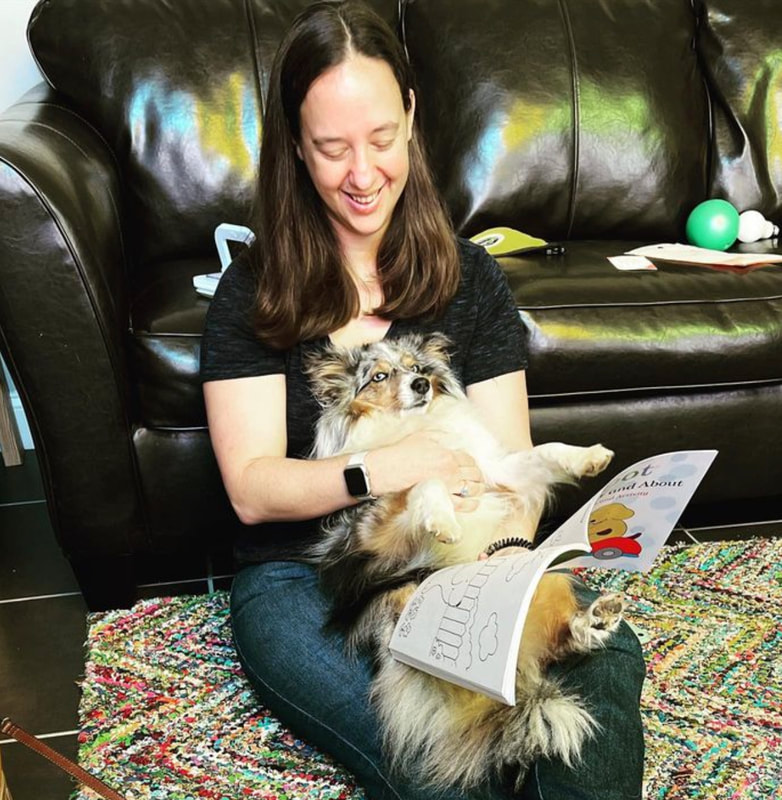
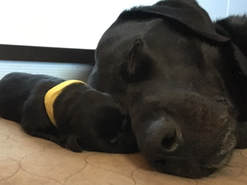
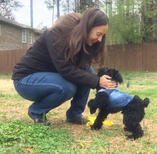
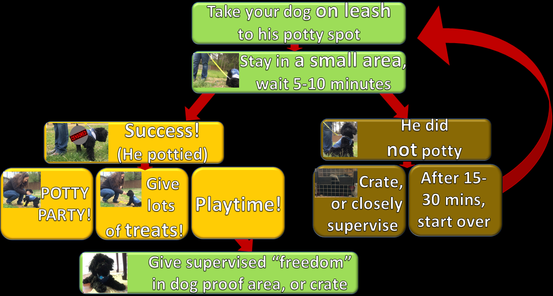
 RSS Feed
RSS Feed
